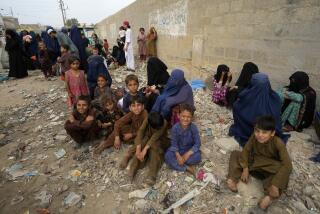Pakistani Vows to Lead Nation to Democracy
- Share via
ISLAMABAD, Pakistan — This nation’s new military leader announced Sunday a unilateral pullback of forces from the border with India and the formation of a military-civilian government to lead the country back to democratic rule.
In a televised address to the nation five days after he seized power, Gen. Pervez Musharraf did not set a timetable for a return to democracy, but he pledged that the army will stay in power for only a limited time.
“This is not martial law, only a path to democracy,” said Musharraf, who was dressed in his military uniform. “The armed forces have no intentions to stay in charge any longer than is absolutely necessary to pave the way for true democracy to flourish in Pakistan.”
Musharraf’s speech was the first articulation of his vision for Pakistan since he toppled democratically elected Prime Minister Nawaz Sharif on Tuesday. Since then, the general has declared emergency rule, suspended the constitution and arrested dozens of Sharif’s supporters. Pakistanis across the country have welcomed the coup and celebrated the fall from power of Sharif, who was widely regarded as inept and corrupt.
The general announced the formation of a six-member council of military officers and civilian experts to help govern the country. He enumerated a series of proposals, including a plan to revive the shattered economy and another to recoup public money stolen by corrupt politicians. Sharif is widely suspected of having stolen millions of dollars in public funds, and his predecessor, Benazir Bhutto, is alleged to have taken as much as $1 billion.
Musharraf’s gesture toward India was the most surprising part of his address. India and Pakistan have fought three wars since 1947, two of them over the disputed Himalayan region of Kashmir. As army chief of staff, Musharraf was widely believed to have orchestrated an armed Pakistani incursion into Indian territory earlier this year, which led to the worst fighting between the two countries in more than 25 years. Pakistani leaders withdrew the force after coming under intense international pressure.
After congratulating Indian Prime Minister Atal Behari Vajpayee on his recent reelection, Musharraf said he would order “a unilateral military de-escalation on our borders with India and initiate the return of all forces to where they were.” He called for a resumption of talks between the historical rivals.
“It is our desire that the situation on our border should remain calm and peaceful,” Musharraf said. “I hope this step would serve as a meaningful confidence-building measure.”
In solemn tones, Musharraf also told Pakistanis that the hopes their country harbored at its creation 52 years ago, when Britain relinquished colonial India, have been snuffed out by decades of corruption and authoritarian rule.
“Today we stand in darkness,” the general said. “We have lost our honor, our dignity, our credibility. What Pakistan has experienced in recent years is merely the label of democracy, not the essence. I promise you that I shall not let the people be taken back to an era of sham democracy--but a real one.
“A lack of accountability has resulted in corruption of horrendous proportions that is threatening the very basis of society,” he said.
In a symbolic gesture, Musharraf said he would make his tax returns and a statement of his assets open to the public.
Although he said nothing directly about Sharif, Musharraf did attempt to justify the overthrow of the prime minister. Sharif had tried to fire Musharraf on Tuesday when the general was out of the country, and the general implied that Sharif also had tried to kill him by refusing to allow his plane to land in Pakistan.
“The choice before us was between saving the body--that is, the nation--at the cost of losing a limb, which was the constitution,” the general said. “I chose to save the nation.”
Pakistanis generally welcomed Musharraf’s remarks. Many said they are willing to give the general a try at reviving the country’s political system and rooting out corruption, even if that means deferring democracy.
“I think this means he will be in power at least two or three years,” said Najam Sethi, a newspaper editor who was jailed during Sharif’s reign. “To admit that Pakistan has hit rock bottom and that every institution has collapsed--that alone will give him credibility with the people.”
Musharraf also promised Sunday to curb Pakistan’s nuclear weapons and missile competition with India, a source of alarm in the region and around the world. India and Pakistan both conducted underground nuclear tests last year, and since then, both have tested missiles designed to deliver nuclear warheads into each other’s territory.
Despite Musharraf’s offer of restraint, however, his exact intentions were unclear. The general promised to continue “moral, diplomatic and political” support for the insurgency inside Indian-held Kashmir--the very policy that India is demanding that Pakistan cease.
Indian leaders reacted cautiously to Musharraf’s remarks, saying the proposed pullback was not from the cease-fire line in Kashmir, where tensions between the two nations are highest.
“They say they will pull back from the international border, [but] tension was not on the international border. It was on the Line of Control,” Indian National Security Advisor Brajesh Mishra told Star Television, a private network.
The Line of Control is the cease-fire line dividing Kashmir between the two nations, where firing across the border is routine. Suspicious Indian leaders put their troops on high alert immediately after Musharraf’s coup.
In a show of tolerance in a country racked by extremism, Musharraf also told Islamic clerics to rein in followers who “are exploiting religion for vested interests and bringing a bad name to the faith.” And the general distanced himself from the Taliban, the fundamentalist Islamic movement that controls about 90% of Afghanistan. Pakistan has been the Taliban’s principal backer. Musharraf called for “a just and peaceful settlement” of the civil war in Afghanistan and “a truly representative government.”
The U.S. welcomed Musharraf’s pledge to seek an eventual return to civilian rule but expressed disappointment that he did not provide “a clear timetable” for such a transition.
In Washington, State Department spokesman James P. Rubin said the U.S. will “watch closely as the general acts to fulfill his pledge to return his country to democracy,” and he called on Musharraf to set a firm date for transferring power to a civilian government.
Rubin also suggested that Musharraf “expand” his announced drawdown of military forces to include troops stationed along the Line of Control.
The spokesman’s remarks, contained in a written statement that the department made public late Sunday, also pointedly endorsed Musharraf’s pledge to institute a “policy of . . . restraint” on nuclear weapons and missiles.
But Rubin left no doubt that Washington remained disappointed.
“We do not believe military takeovers are the appropriate method for resolving the problems that face democracies,” he said.
The U.S. view was paralleled by British Foreign Secretary Robin Cook, who also expressed chagrin at the omission of any target date for restoring civilian government.
“A commitment to an eventual return to democracy is insufficient on its own,” Cook said. “It needs to be accompanied by a credible and clear timetable.”
And while many Pakistanis said they will back Musharraf, a few said they were skeptical that the military can govern any more effectively than civilians. Sumaira Akbar, an architect in Islamabad, said she was torn between her admiration for Musharraf and her suspicion of the institution he works for.
“He is my hero,” she said, “but the uniform is a problem.”
*
Times staff writer Art Pine in Washington contributed to this report.
More to Read
Sign up for Essential California
The most important California stories and recommendations in your inbox every morning.
You may occasionally receive promotional content from the Los Angeles Times.










